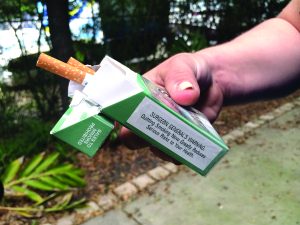It’s hard to argue the numbers against smoking: It’s caused 20.8 million deaths since 1965, it’s been linked to 12 kinds of cancer and 17 chronic diseases, and can create similar problems to anyone else exposed to the smoke, according to the U.S. Surgeon General.

(Michael Hinman/Staff Photo)
So for Pasco County, banning cigarette smoking is a no-brainer. However, preventing smokers from being hired by the county? That might be a little more problematic.
Yet Pasco is starting that push, although county performance development director Marc Bellas admits that he’s still not sure exactly how the new program will shake out.
“Everyone in this organization knows this is coming, but what we don’t know is what it will look like, when will it happen, and how it will impact each one of them,” Bellas said.
Governments have found some success — and failures — when it comes to implementing policies that would ban hiring smokers. Temple Terrace made national news more than a decade ago when it tried to control smoking in its workforce, and the negative backlash caused them to change gears.
But that was a different time, when Florida’s ban on indoor smoking in most public places was still in its infancy. In 2003, the argument was to help lower health insurance costs. Today, however, the carrot being dangled is healthier living.
“What they’re looking for is kind of a more environmentally friendly and positive work place,” said county public information officer Doug Tobin. “That includes a smoke-free campus, as well as a policy where new employees would be prohibited from smoking.”
And the idea is not new in Pasco County. Both the fire department and sheriff’s office already restrict smoking among employees, Tobin said, and the county itself has flirted with the idea for several years now.
A smoking policy for the county government is far from complete, Bellas said. However, he brought up some initial ideas to the Pasco County Commission last week to get some of their feedback.
In its current form, employees hired after Oct. 1 would be required to sign an affidavit affirming they have not used tobacco products for one year, and agree to submit to a nicotine test if they’re every suspected of smoking. Those who were hired before Oct. 1 would no longer be allowed to use tobacco products while they are on the clock.
New hires would not be allowed to smoke or use tobacco products at all, not even at home, or on the weekends. If they are discovered to have violated the policy, they could be disciplined and even fired.
Yet, even Bellas admits that sometimes a plan looks far better on paper than it does in the field. And his goal is to not make it more difficult to compete for good employees with other counties and private industry by having too restrictive of a policy.
“We have a few challenges that we can’t ignore,” he said. “Between 24 and 25 percent of our employees right now use tobacco, and a lot of them are in the entry-level positions in roads and bridges, and in utilities. The folks in those departments already have a hard enough time keeping those positions filled. If we take one more thing away, and they believe it’s going to be a problem, then that is not a good choice for us.”
That means there’s still a lot of work to do on the policy before it’s completed, Bellas said, and there’s a good chance that what is finally approved to begin next October could be quite different from what’s on the table today.
And the talk alone of implementing the policy seems to have had some positive effect already. Commissioner Henry Wilson, who serves on a committee addressing this issue, told commissioners at the recent meeting participation in smoking cessation programs has drastically increased over the past two months.
“They know the conversation has started,” Wilson said. “This is nothing else but to create a healthy work environment, and that’s what we’ll try to do.”
Published April 2, 2014